Last Sunday was our last trip “down in the Valley” for a while, as the second season of P-Valley came to a close. Set in the fictional town of Chucalissa, Mississippi, the show chronicles the life of the framily at The Pynk and, for some, the season’s end brings happiness. Everyone else, though? Molly, you in danger, girl.
The club’s proprietor, the non-binary revelation that is Uncle Clifford, got her happy ending: her Grandmuva free from Covid, outright ownership of her club, the likely influx of new patrons from the town’s forthcoming casino and the man she’s coveted since the show’s start, loving her out loud. Mercedes, Clifford’s bottom bitch — the longest serving dancer at the Pynk — finally got what she wanted: her daughter, her gym, her money and a retirement performance worthy of her legacy.
But not everyone made it out of the season unscathed. Hailey leaves Chucalissa — and, presumably, the father of her future twins — with far less money than she thought she’d have when she took the Pynk off the auction block. Lil’ Murda might think he’s won, now that he’s been welcomed back into Uncle Clifford’s arms, but a rival gang is coming for him. Asserting control over a world that’s done nothing but take from her, Roulette steps fully into pimp mode, recruiting girls from the club for her stable. And just as Keyshawn (AKA Miss Mississippi) is about to escape her abusive husband, the rug gets pulled out from under her. And let’s not even talk about Diamond… poor, poor Diamond…
With so much going on, we had to take a trip to the Valley. Shelli, A. Tony, Carmen and Natalie got together to talk about P-Valley’s queerer second season and how the show is truly changing the game.
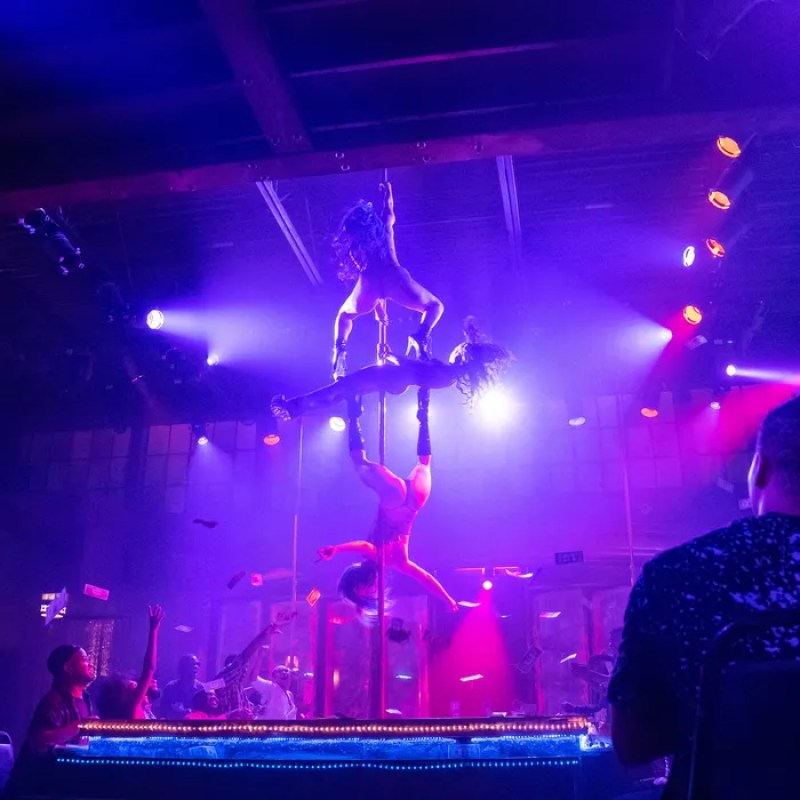
P-Valley
A lot of people, when they hear that P-Valley is a TV show about a strip club, they think about spots like The Landing Strip from Friday Night Lights, Bada Bing from The Sopranos, or Xavier’s from Hightown… but P-Valley really has changed the game on how strip clubs are depicted. How does The Pynk fit in with both your understanding of strip clubs, both in real life and how they’ve been depicted in pop culture? What do you think P-Valley’s doing that’s unique and/or interesting?
Shelli: I am not familar with any of those other shows’ strip clubs but what I do know is that The Pynk is inherently Black. Real life strip clubs that are white are so boring, they are lackluster and it is folks doing the bare minimum and it being celebrated as being the best. Their dancers hide behind fancy lighting, top shelf booze, songs that are on some top ten lists, and sometimes celebrity chefs. In pop culture though, they are shown as the sexiest places. Like, I’m supposed to be enticed by a barely there white girl swaying side to side to some slowed down version of a Panic At The Disco song?
I’m sorry but in so many parts of life I still get very upset when white folks are celebrated for doing the very, very least and when white women get like, all the praises for simply being white. And I’m also very sick of being labeled as a hater or bitter Black woman for feeling that way and announcing it — but that’s for another roundtable.
What P-Valley has done — what The Pynk has done — is shown us that Black women fucking do work. It’s shown so many variances of size, color, ability, sexuality, and more of strippers and shown that Black strip clubs are simply far superior. Whether it’s big and fancy like Magic City or local and small like The Pynk. I don’t know if what they are showing about strip clubs could be labeled as unique to many of their Black viewers who are already familiar with what Black strip clubs are like (a strip club is only as good as it’s wings), but, it is hella unique in the aspect of what is usually shown of strip clubs in pop culture.
A.Tony: Oh my gosh, this question unlocked a memory for me. I was like “I’ve never been to a strip… ohmygosh, how could I forget!” (it was very white :sad face:).
As Shelli said, I’m not familiar with those shows’ strip clubs, but P-Valley feels extremely special because this felt like a place that I already knew. When you love Black women and Black queer people and you are a Black queer person yourself, just about any place where they live, you’re just gonna feel at home there. There is no other strip club depicted in pop culture that I’d rather be at than the Pynk.
Shelli: It’s also shown us the history of some of these places and their evolution. From the jook joint to the shake shacks to the blind pigs and discos… that was cool as fuck. These spots are more than buildings and the booty that’s in them. For some, it’s their family history and, for a lot of Black folks of the millennial generation, specifically in or from the South, we don’t have a lot of family shit to hold on to.
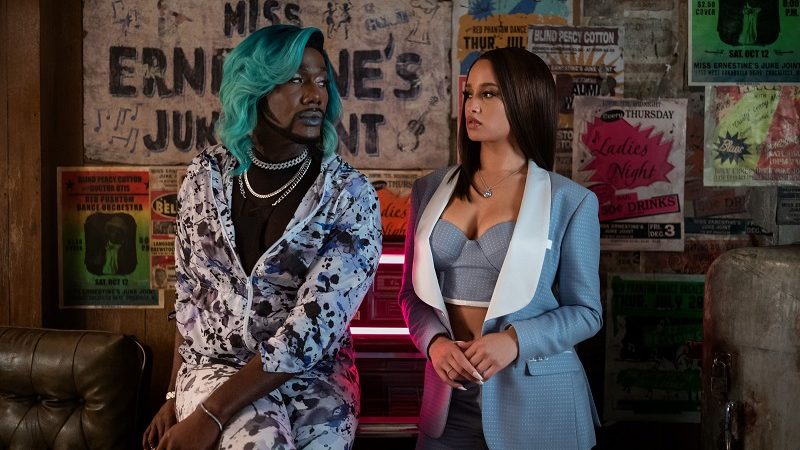
Nicco Annan as Uncle Clifford Sayles and Elarica Johnson as Hailey Colton / Autumn Night
A. Tony: Yes! Seeing Grandmuva Ernestine and Uncle Clifford through the years, with the Pynk as their sun, was extremely important to me. There is consistent violence against Black people, not just in the very obvious ways, but in intricate, almost subtle ways. Most of us don’t have family shit to hold on to and many of us can only count as far back as our great grandparents (if we’re lucky). I love seeing something that Uncle Clifford loves, respects, and works to keep alive not just because it means something to her but because it means something (everything) to her family too.
Natalie: Having spent most of my life in the South, the Pynk echoes with familiarity. Not because I was a fixture in the clubs — though there was that period where my brother valeted for a local club and my visits became more frequent — but because its so embedded in the culture. But no one’s showcasing that on television, especially not with blackness and queerness and southernness at its center… no one but Katori Hall.
The thing about nearly every other show that features a strip club is that the women and the club itself are just scenery. The club is just a front for some shady business, most of the strippers — who are mostly white and almost always rail thin — go nameless and, in the moments where we get to see the women work, the focus is exclusively on whatever person is consuming the product. P-Valley really upends all of that.
The women are the center of the story — their work, their effort, their art — and P-Valley and its stable of all women directors, respect that like no one ever has on television.
There was a lot of time spent this season on establishing the club’s lineage, as Shelli pointed out, so the Pynk becomes more than just a building to its audience. Uncle Clifford works hard to shape the Pynk into a legitimate business, even if Hailey, Big L and Roulette’s machinations test her on that front. The strippers have names and different skin tones and body types… and they each have their own story of what brought them to the Pynk. Even as the floor of the Pynk floods with every-damn-body in Chucalissa, the focus is on the performers.
The central love story of P-Valley has been between Uncle Clifford, the nonbinary owner of the Pynk, and Lil’ Murda, the closeted up and coming rapper. What do you think about how the show — and, in particular, the season finale — handled that storyline?
Shelli: I LOVE IT. Like, to see two niggas on TV — dark, thick, tatted, southern, street niggas — in a situationship that evolves into something more? GIMME GIMME GIMME MORE. I think that we all know these relationships exist in the Black community, but I’ve never seen one in pop culture that was handled this way.
Carmen: I kept comparing it to my first loves, Noah and Wade in Patrik-Ian Polk’s Noah’s Arc in the 00s (Polk is also an executive producer on P-Valley), which is already awful because 20 years later… how is it still somehow only Noah and Wade that we have to reach back to? But Shelli, you’re absolutely right! Because Noah and Wade still weren’t this. Uncle Clifford and Lil’ Murda are simply unrivaled. The specificity of seeing such deep storytelling, hard fought and loving, set in the Black South? Nothing like it.
Shelli: When Uncle Clifford said that she was not about to be loved in the shadows, but still kept up with what Murda was doing, it felt the opposite of toxic. Clifford knew why Murda couldn’t come out and love her out loud. She knew he wasn’t capable of loving her in the ways that she needed and she didn’t do what a lot of Black women and femmes are taught to do in love, which is to hold fast to what someone is capable of doing and be hella cool with it even if it’s the crumbs of what you deserve.
Then seeing Murda pine over Clifford — the postcards, the texts, the fucking someone else even though you wish it was them — was this sorta odd sweetness. I was so hopeful that life would let go of the hold it had on Murda, and that Uncle Clifford would keep their boundaries but still let him back in slowly.
So when they got back together and then had that personal moment in the finale. That kiss and that look… where you can be in a room full of people but it feels like it’s just yall… it was beautiful. Then when they both looked at everyone like “I know y’all ain’t surprised but also what the fuck are you looking at?” I screamed with laughter but I also have that tinge of fear. Yes, they can be accepted by framily but also, they are two queer niggas in the deep south and there are lots of folks Black and non, who are ready and willing to hurt them in a million ways.
Some scenes just stick with you. Shoutout to @AllDayNicco and @JAlphonse_N for bringing this one to life. #PValley pic.twitter.com/coN4TeSjye
— P-Valley (@PValleySTARZ) August 16, 2022
A.Tony: Have Uncle Clifford and Lil’ Murda made me believe in love again? Low-key Ryan Wilder and Sophie Moore already did that, but they have definitely made me twerk in rejoice of the good news!
I am incredibly obsessed with this love story! Every damn Sunday night, my friends and I have been in the chat crying over how these two have invented love and I am STUCK on them. I cannot even fully articulate how much it’s meant to me to be full ass wrong about my initial thoughts around Lil’ Murda. Remember in the first season when he was cutting in line and everybody told him his music was slaw? (Y’all we were so young!). And now, I had to have tissues at the ready whenever he came on screen.
I knew I was gonna love Uncle Clifford as soon as I saw them holding Keyshawn’s baby in season one, but I was so not prepared for them to get a really good and true love. Like Shelli said, their love is definitely not without a shit ton of pain and hurt, and there’s no promise that that is not on the horizon for them both — God, I hope it’s not — but to see them in love inside all of the places that they love most has been really important to me. It may have been more articulate for me to just scream for five minutes straight with intermittent sobbing ’cause that’s all I do when I see them.
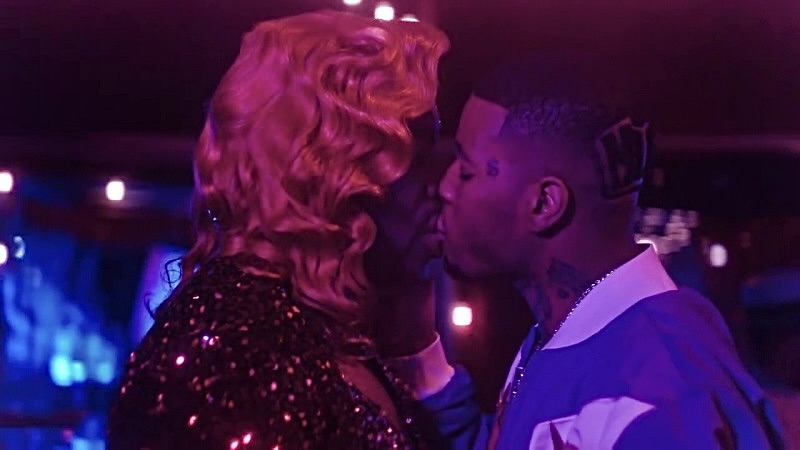
Nicco Annan as Uncle Clifford Sayles and J. Alphonse Nicholson as LaMarques / Lil’ Murda
Natalie: No, that was perfect, A. Tony. You and Shelli both really laid out the reasons I (and everybody who watches P-Valley) love Uncle Clifford and Murda together. I will say, though: for all my love of this pairing, I didn’t love the season finale for them.
Do I think there would come a day that one day Murda would be willing to walk away from the life he was building and love Clifford out loud? Yes. Would there come a day when Clifford would be willing to accept the love being offered to her, without fearing that the rug would be pulled out from under of her Louboutin clad feet? Absolutely. From the first time they connected in season one, there was never any doubt in my mind that Clifford and Murda were endgame. BUT, was I convinced that endgame should’ve come this soon into the show’s run… or that the both characters were at a place, mentally and emotionally, where they would step out on faith? Not at all… not even a little bit. I know that’s not something that matters to a lot of folks. People just want to fast-forward to the end and get their happy ending but the journey matters… and I think it matters for folks who see themselves in those two characters.
Here’s what I think happened: for some inexplicable reason, STARZ hasn’t renewed this show. Why this network persists in delaying the renewal of female-fronted properties while giving renewals to all their male-fronted properties (even the ones with lower ratings), is anyone’s guess. They can give us fifty-eleven Power spin-offs but they can’t give fans an early renewal of P-Valley? Dammit, STARZ, I just forgave you for canceling Vida… and now you’re playing with my emotions again?!
But I digress… it feels like the network’s indecision impacted the storytelling…l ike, maybe the show will be back, maybe it won’t… and in the event that it won’t, the show chose to give happy endings to its fan favorites: Clifford and Mercedes. There’s still plenty of story to tell with Cliff and Murda — chief among them, whether Murda will even survive to enjoy his happy ending — but to me, it felt like the show rushed to get to this place and it wasn’t as satisfying as it should’ve been.
In part because of the pandemic (but also because of her triflin’ mama), Mercedes had to go outside The Pynk to find a way to make money this season. She ultimately agrees to a sponsorship deal with one of her clients… and eventually the client’s wife wants her own piece of The Mercedes Experience. It’s the first depiction of a lesbian relationship on P-Valley. What’d you think about the storyline?
Shelli: DOPE, GREAT, SWEET, MEAN, SEXY, WILD, BEAUTIFUL. Like, I think it really hit for me when Mercedes and Farrah were at her art show. When Mercedes was like, that was business… but then said it was a little bit of pleasure. I don’t know if Mercedes is lesbian but I do think Farrah is queer because in her telling off of coach she said she loved pussy more than her husband — but he never knew ‘cos he was not paying attention to her.
I think I was more entangled in Farrah’s side of it, she was a woman who put her dreams and life aside to satiate her husband, something many Black women of a certain generation did and then taught a lot of their daughters to do as if it were the norm. Yes, seeing the two of them together was beautiful, but I always read it as more work than reality, Mercedes doing what she had to do and this part of it maybe wasn’t so hard but it was still work. I liked what came of it, that the two of them realized some things in their personal lives as a result of their tryst. Farrah stepping away from coach and going back to her own dreams, and Mercedes doing the same.
I’d like to see a storyline between lesbian characters who are written as queer from the very start, but this was still very dope, incredibly beautiful, and written as lovely as could be.
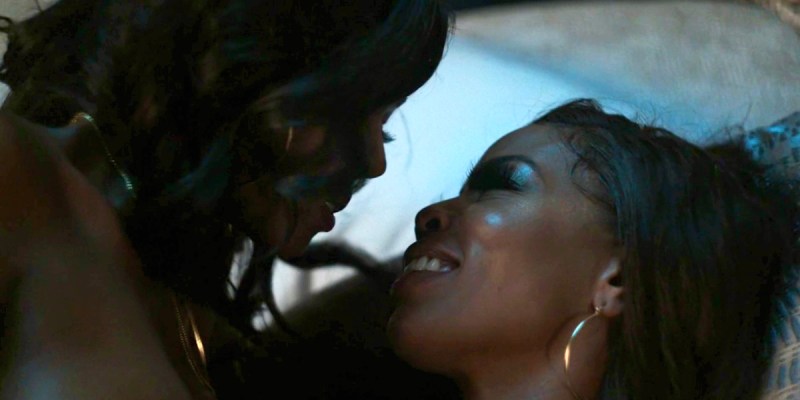
Shamika Cotton as Farrah and Brandee Evans as Mercedes Woodbine
Natalie: That’s an interesting read on the story because I saw it so differently. I don’t think it was all about the money for Mercedes.. in fact, after their night together, I think she’s genuinely surprised to wake up and find those stacks on the night-table. The moment in the art gallery was really perplexing because, it seemed like the show wanted to both have this relationship be strictly transactional but also have it be this thing that fundamental changes both their lives. That seemed incongruent to me… both those things can’t be true.
To your point about Farrah, Shelli… based of what she says to Coach (“you don’t even know that I like pussy just as much as you. Hell, maybe even more!”), it’s not hard to imagine her having these quiet lesbian affairs throughout her marriage. But, for this — for the Mercedes Experience — she breaks free from a mask she’s been wearing for 19 years? She leaves her husband and the security of his money, to embrace happiness… over a transaction? Over a fuck? That strains credulity to me. I think she found in Mercedes someone who saw her and her talent and who showed her what strength looked like. I don’t think that evolves into a lifetime love affair or anything like that but it was meaningful and I was disappointed in the show for treating it like it wasn’t.
Carmen: I genuinely wanted to love Mercedes and Farrah, but I couldn’t. I think that Shelli brings up some very important points from Farrah’s point of view — about coming breaking away from Black compulsory heterosexuality late in life. And I agree with Natalie that it wasn’t all about the money for Mercedes. But this was my breaking point, and the show never repaired it: PAY SEX WORKERS FOR THEIR WORK!!
When the coach realizes that Farrah and Mercedes have had a tryst together — he refuses to pay Mercedes for their previously contracted time as a threesome. Mercedes signed an NDA and everything. And because he got his feelings hurt, he literally took her 40 stacks, cash, off the table in front of her! And Farrah just… let him do it? And gave Mercedes “I’m sorry” eyes? Absolutely not. Mercedes should have sued. If you don’t pay sex workers for their work, that is an assault as far as I’m concerned. Do not pass go.
I do think the show tried to clear up their mess in the finale, when Farrah sells artwork she made based on Mercedes’ likeness and pays her for the rights. But confusingly, Farrah goes out of her way to say that it’s not the money she’s owed from coach?? Ok great, so then Mercedes is still out her original 40 grand? You said this woman changed your life? Then show respect. Pay! Her!
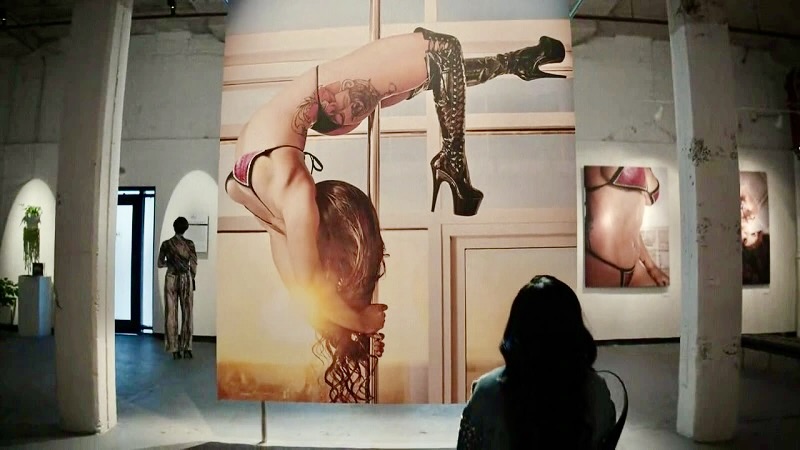
Brandee Evans as Mercedes Woodbine
A.Tony: Listen, damn near anything Mercedes wants to do, I am in full support of. Her leaning into some Sapphic situations? YES, MORE PLEASE. When they were holding hands and staring into each other’s eyes through Mercedes’ orgasm, after Farrah moved her husband out the way ’cause he wasn’t doing it right? I AM HERE FOR IT.
To be quite honest, I really didn’t think we’d get more than one queer character/storyline this entire series, so they were already exceeding my expectations. I’m really glad that there are multiple queer people in this show because it feels reflective of the Black South *I* know, and it is just really good.
Natalie: That’s such a good point, A. Tony. So often, shows only tells one type of queer story at a time — a gay or lesbian relationship, most often — and there’s no thought about community, but P-Valley builds that in season two. In addition to Clifford, Murda, Farrah and Mercedes, you’ve got Clifford’s queer friends — her Ace Boon Coons — who show up to celebrate Clifford’s birthday. It looks like one of her ABCs, Nineveh, is going to play a bigger role in future episodes… as she agrees to be part of Roulette’s stable at the end of the season.
Carmen: There’s a scene in the finale where Clifford, Murda, and Mercedes are all holding each other in the Pynk’s locker room and my heart leapt. This is my chosen queer family, I’m moving in.
There’s an episode of P-Valley this season (“Demethrius”) that features two queer sex scenes: the first, between Farrah and Mercedes, two feminine cis black women; the second between Lil’ Murda and Big Teak, two straight-passing cis black men. After that episode aired… whew, the homophobia jumped out… social media was just awash in it. How did you process that response, just as someone who has to exist in this world as a black queer person?
Shelli: The hold homophobia has on niggas is tight and probably not letting go anytime soon, lol.
I’m gonna guess that most cishet Black men who watch the show do so in the hopes of seeing the girlies strip and bounce and shake ass. Those of them who are watching it with their straight partners may be doing so out of obligation and didn’t think that the storylines would go where they have.
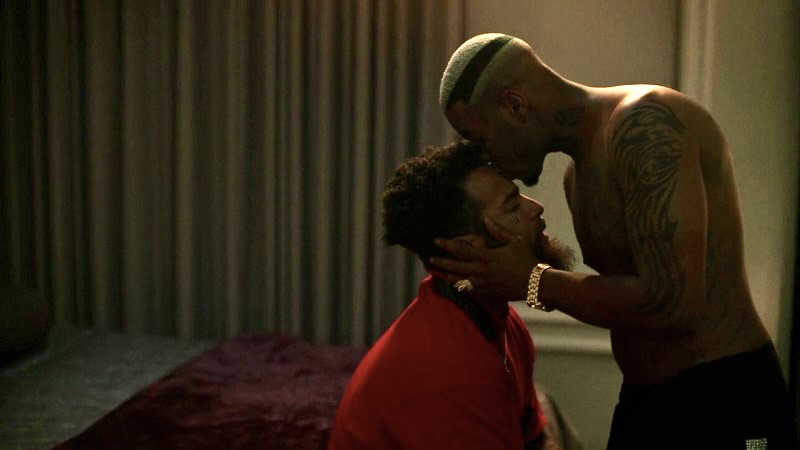
J. Alphonse Nicholson as Lil’ Murda and John Clarence Stewart as Thaddeus Wilks / Big Teak
They were probably weirded out by Uncle Clifford, but because she wasn’t doing anything “very gay” they tolerated it. And they had no issue with Mercedes and Farrah fucking because cishet Black men often think queer women are being sexual or romantic with each other for their pleasure and approval. BUT, when they saw men who probably looked like themselves or reminded them of their friends, fucking? That was too damn far and they had to take to the Twitter streets and meet up at the intersection of Loud and Wrong.
Same with a lot of cishet Black women who watch. They love to kiki with their gay male friends and love to be hit on by their dyke friends and called pretty by their femme friends. They love Uncle Clifford because they see her in the ways they see those same friends they have, as a spectacle. People who they don’t actually see as a real humans with real feelings and real lives. So I was also unsurprised when they hopped online to talk about how disgusting it was or how shows like this are adding to the erasure of “real Black men.”
EYE WAS NOT SURPRISED BY ANY OF THOSE THOTS AND OPINIONS, LOL.
A.Tony: I hadn’t caught up to P-Valley when this happened, so thankfully, most of the stuff kinda passed over my head as regular, shmegular homophobia within the black community. I got through it as usual: going to my group chat and being gayer in there than I was the day before in like some kind of lil resistance. I mean, it’s not little, it is often the difference between my survival and the absence of it, but yeah. Afterwards, when I’d caught up and remembered most of what had been said, it still didn’t really register ’cause like, that’s my family and what I grew up with so. I don’t know what to say beyond that.
Natalie: Unfortunately the hate hasn’t stopped. The rapper Plies dropped a video earlier this week about this — I guess he waited for the entire season to drop and then binged it — and, while it’s not surprising, the shit’s just so disheartening. While the bulk of the comments weren’t about the two women… there’s still a sense that if either of those women weren’t sufficiently femme, they’d be cast out as well… I’d be cast out.. and my friends would be cast out too.
It’s easy to convince yourself sometimes that we’re further along towards equality than we actually are — especially when you’re in community so often — but then something like this happens and snatches you right back to reality. Like, you can’t even revel in the value of this representation, without a reminder of the world’s bigotry. It’s just fuckin’ disheartening.
Shelli: I didn’t process it at all lol, because those people don’t matter to me and their opinions are not ones I care about. I am no longer in the game of helping homophobic, transphobic, and non-binaryphobic (is that a word?) straight, conservative (even though they won’t admit it) Black people change their ways. That is no longer my ministry. So while it saddens me sometimes, it’s not up to me as a Black queer dyke lesbian to teach them and use my platform as a writer to write think pieces that will inspire them to change. There are enough of those out in the world, there is enough information for them to teach themselves and instead what I will do is watch moments like this in pop culture — where two nigga ass niggas — kiss, softly touch, pleasure and escape into each other.
This season of P-Valley dealt with so many different issues: Covid, police brutality, Big Teak’s mental health, the abuse Keyshawn deals with (both from Rome and Derrick), Terricka’s pregnancy, the colorism that Roulette experiences, just to name a few. Which story resonated the most with you and why?
Natalie: When we close the books on this year in queer television, P-Valley will undoubtedly rank among my favorites. It’ll rank among the best of 2022 not because it told one affecting story… but because it told so many, in smart and compelling ways. The writing was brilliant and deserves so much recognition. And what’s doubly miraculous about it is that the show never seemed overstuffed or like it was doing too much… it was all just real shit people go through…
Carmen: That part.
Shelli: For me, the story that hit hardest was probably the colorism, because again, every time I bring it up there is a chance I get called a bitter or hatin’ ass Black woman. Colorism against dark skinned Black women exists but also some light-skinned people are cool. BOTH OF THESE THINGS CAN BE TRUE, LOL. I really don’t wanna dive into it anymore, but I will say that Roulette is my favorite character on the show, and Gail Bean has always been a phenomenal actress.
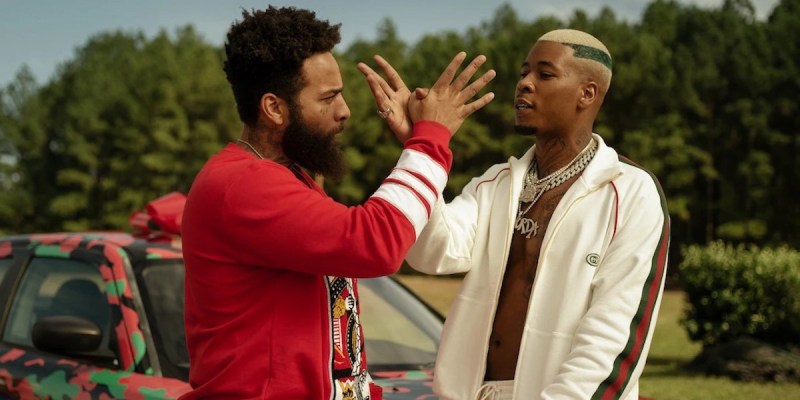
John Clarence Stewart as Big Teak and J. Alphonse Nicholson as Lil’ Murda
A. Tony: Big Teak and Keyshawn got me in my chest, man.
Big Teak’s face when he sees the postcard Murda prepared for Uncle Clifford and he says, “you ain’t never write me no postcards.” There’s a lot that can be said (and has been said by others more knowledgeable about it than me) about feeling left behind due to incarceration, due to mental illness (this one I get). Then to see that walk hand in hand with a love that cannot exist in the same way it did before — a love that just could not grow into something else because one of the lovers was just left behind — just really kind of messed me up.
I get Big Teak’s reasoning on a lot of things a lot more than I’m comfortable with acknowledging. And even though I want the people I love to live forever, I felt relief for Big Teak in that car. At least the last thing he saw and knew was that he was loved. There’s such an emphasis on “getting better,” especially within the Black community — if they acknowledge that you’re not doing well at all — that just isn’t the story for a lot of us. The world is cruel, especially to Black queer people, people who’re mentally ill, people who’ve been incarcerated and especially those who live at those intersections. But our collective suicide prevention practice is to not acknowledge that and push people forward in spite of it.
Our attempts at prevention are rooted in our own fear of mortality. We avoid looking too deep, fearing that we may see ourselves in that the suicidal person… after all, any person can run out of options at any time. It’s not always an inherent failure on being unable to keep people alive, there are systemic barriers that keep us from being able to show up in community the way we want to, the way our people need. To see Big Teak say, “no, this is too much” and just end it and Murda knows that there was nothing else he could do to help him, except just, be with him, I think says a lot not just about how we need community in both the difficult places in life, but as we get to our ends, and do whatever it is we do on the other side. I don’t know. I’ve struggled with passive ideation since I was a kid, and this doesn’t make me want to do anything, but it offers a kind of, “I see you” in a way I can’t explain. To have someone not shame you for giving into the things that have weighed you down, to have someone still sit in that car with you, anyways: it’s a story I’ve never seen for my people and it’s a story I need.
Natalie: As someone who’s dealt with ideation myself (and written about it) and who also understood Teak’s mindset in that car more than I’d care to admit… I really appreciate you being vulnerable and sharing that.
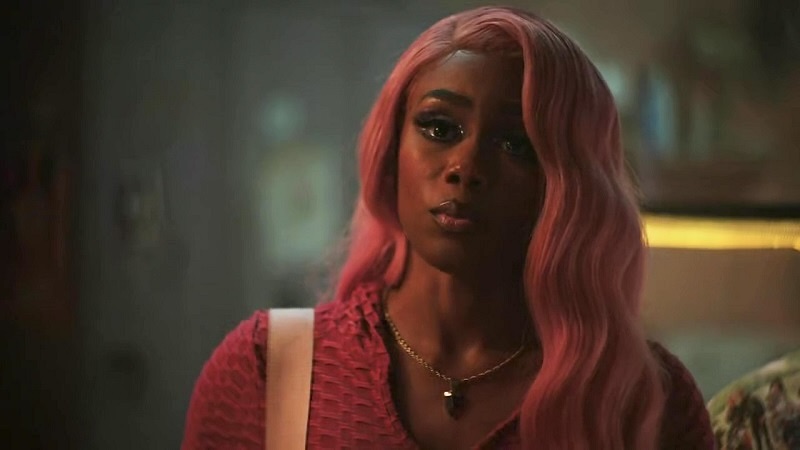
Shannon Thornton as Keyshawn Harris
A. Tony: Keyshawn messes me up because — Lord, have mercy! With her, everywhere she turns, it’s abuse: a step-mother at home who hated her and kids at school who hated her, knowing what her father probably did to her step-sister, domestic and sexual abuse not just from her husband but other men she trusted. The abuse is everywhere and it feels like she’s stuck… even more so after the bullshit Derrick pulled in the season finale.
It’s hard watching Keyshawn’s story because it’s true. Being stuck, for Black women, especially in abuse, is not a new thing. The people who love you, trying to get you out, but not knowing the extent in which your abuser will work to keep you, it is not a new thing. I don’t know a Black woman or Black queer person who hasn’t been abused and though some get community support, it’s so hard to be able to escape in a way that allow you and your loved ones to live.
I worry, though, that Keyshawn will turn into a meme or a joke like Tina in What’s Love Got To Do With It. I’m already seeing Black women saying they wouldn’t let someone beat their asses like that — an assertion that’s rooted in fear that they’d respond exactly like Keyshawn if they were in the same situation — and it’s dangerous for this cycle to go on.
Keyshawn’s story fucks me up because all it shows is that we do not protect Black girls and then people get mad at her for not knowing how to protect herself when she becomes a woman. I know Keyshawn grew up, but all I see is the high schooler who molded herself into whatever she needed to be to be loved by Derrick, to be loved by a lot of people who quite frankly do not deserve her, and after spending so long doing that, how do you learn to be anything else?
I’ve heard some people claim that too much of this is for shock value, but I can’t quite agree. So many of Black women’s stories are ignored and by the time people pay attention, it’s too late. I think, the constant tensing of your shoulders whenever Keyshawn comes on screen, the measured breaths when Derrick is in the room, the keeping your eyes on all exits at all times, is the entire point. Black women, Black queer people live in this way all the time and I think it is our responsibility not to look away (and I mean this solely for people who have the space to, not for anyone to re-traumatize themselves).
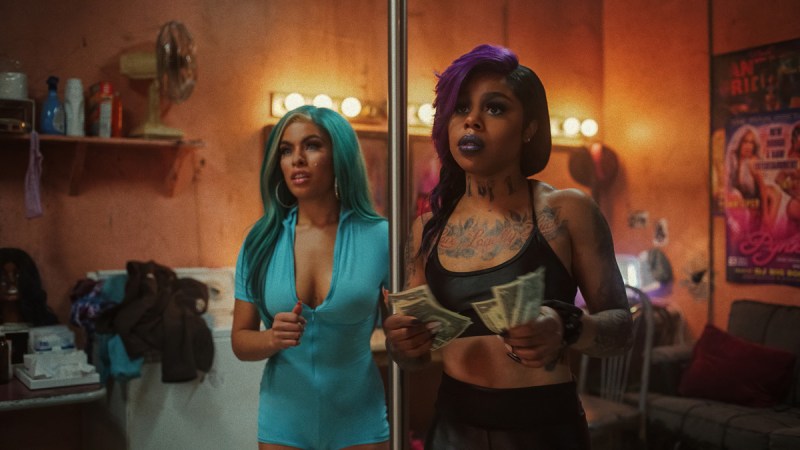
Gail Bean as Roulette and Psalms Salazar as Whisper
You’re heading to the Pynk with a couple stacks in your pocket: who are you inviting to the Paradise Room?
Shelli: ROU—FUCKIN—LETTE and she MUST chew gum the entire time.
Carmen: Absolutely Roulette. No question.
A.Tony: Whisper, I have no idea what she’s doing half the time and I am intrigued as fuck by her.
Natalie: I hope, in this imaginary scenario, I made it to the club before Mercedes hung up her floss… ’cause she would absolutely get all my money.
Favorite piece of wisdom from Uncle Clifford and her Rules?
Shelli: Rule #2 — “Always Know Where The Exit in This Bitch is, Cause You Never Know When You Gotsta Turn a Window Into a Door.” I always know where the exits are in every place I am in. I have a mother who is from Detroit and raised by her southern mother and when I first started going out partying every time I left the house she would say “Dance near the exits ‘cos niggas is crazy and you never know when you need to leave.”
A.Tony: I had to look them up, and I found this one — which was made up by the fans, the Pynk Posse, and is not officially from the show. But I loved it, so I wanted to share it! — Rule #94: “You Can’t Keep Getting Mad at Folks for Sucking the Life Outta You When You Keep Giving Them the Straw.”
Natalie: She said it in the season finale: Uncle Clifford Rule #88: “Don’t Ever Forget: Just ‘Cause a Bitch Good at Keepin’ the Peace Don’t Mean She Ain’t Good at Wagin’ War.” I like to stay quiet and keep to myself a lot, and people like to make all types of assumptions of what I can and can’t do.
Better Made for TV rapper/rappers: Lil’ Murda or KaMillion and Aida from Rap Shit?
Shelli: I’m sorry but KaMillion and Aida HAVE YOU HEARD SEDUCE AND SCHEME?!
A.Tony: I’m sorry I don’t pit bad bitches against each other, I cannot answer at this time.
Natalie: I’ve got to represent my home state — J. Alphonse Nicholson is from North Carolina (#EaglePride) — and say, “it’s Murda!” Besides, I’ve had “When I Get Out” and “Get It On The Floor” on constant rotation.
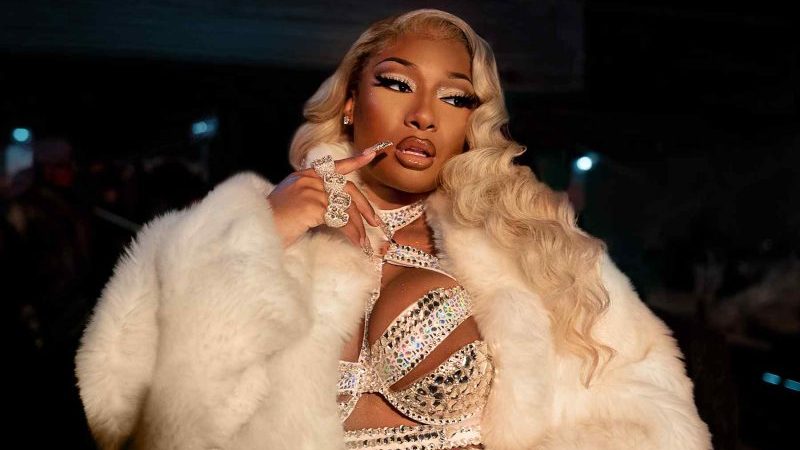
Megan Thee Stallion as Tina Snow (who is also Megan Thee Stallion)
This season gave us guest appearances from Big Freedia and Meg Thee Stallion. Who’s your must have guest for season 3 of P-Valley?
Shelli: Saucy Santana.
A.Tony: This fits nothing, please know I’m aware, but please imagine Beyoncé’s “Alien Superstar” playing while Janelle Monáe as Cyndi Mayweather just descends from the ceiling. Whisper would be really into that shit and I just want to know more.
Is Autumn Knight Lakeisha Hailey Colton the Jenny Schechter of P-Valley?
Shelli: Lol, HELP, but yes.
Carmen: THE SCREAM I JUST SCREAMED
Natalie: Abso-fuckin-lutely.
A.Tony: I don’t even know Jenny but I know this is true, except I guess that Hailey lives? Jenny doesn’t make it.. right?



You know, I never really thought about it that way but Hailey is absolutely the Jenny Schechter of the show. Although she is better than Jenny simply because this show doesn’t let her get away with most of her bullshit.
My read on Mercedes sexuality was that she was Bi just based on her interacting with Coach, Farrah, and Mane with the same energy throughout.
I don’t have this show but loved reading y’all talk about it! Smart, funny, tragic.
I am really looking forward to watching this – thanks for the conversation!